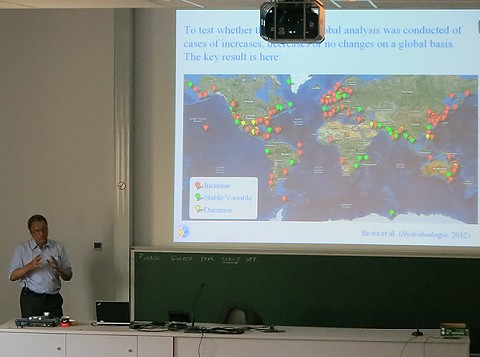 Daniel Pauly is the leading fisheries scientist of our time and one of the most prolific of all times. He is one of the two founding fathers of FishBase the successful web archive about all fish species known to science and a public darling serving more than half a million users month after month.
Daniel Pauly is the leading fisheries scientist of our time and one of the most prolific of all times. He is one of the two founding fathers of FishBase the successful web archive about all fish species known to science and a public darling serving more than half a million users month after month.
In 1999, Prof. Pauly set up the Sea Around Us Project at the Fisheries Centre of the University of British Columbia (UBC), Vancouver, Canada, to document large-scale impacts of marine fisheries. It became highly influential by providing independent assessments of marine fisheries and their effects on marine ecosystems across all oceans and seas. The project is supported by the Pew Charitable Trusts.
His many international students and collaborators have developed path-breaking work about catch reconstructions to identify the gap between actual extractions and what governments report to the Food and Agriculture Organization of the UN as the basis for global production figures.
 The underreporting of real catches is very high in many countries and islands, sometimes entire fisheries have disappeared without ever appearing in national accounts. China has been shown by Watson and Pauly in 2001 to over-report its domestic catches, but is seriously underreporting its foreign catches according to the latest 2013 study by Pauly and his team. Such distortions can harm e.g. local fishers in West African and lead to bad investment decisions.
The underreporting of real catches is very high in many countries and islands, sometimes entire fisheries have disappeared without ever appearing in national accounts. China has been shown by Watson and Pauly in 2001 to over-report its domestic catches, but is seriously underreporting its foreign catches according to the latest 2013 study by Pauly and his team. Such distortions can harm e.g. local fishers in West African and lead to bad investment decisions.
The most outstanding scientific achievements of Prof. Pauly are the conceptualisation of 'shifting baseline syndrome' and his fundamental work on why gill-breathing organisms grow the way they do and the far-reaching implications this has for literally all aspects of how aquatic ecosystems function and can be used by humans, including aquaculture (1).
The present interview was granted in September 2012.
(1) Pauly, D. 2010. Gasping Fish and Panting Squids: Oxygen, Temperature and the Growth of Water-Breathing Animals. Excellence in Ecology (22), International Ecology Institute, Oldendorf/Luhe, Germany, xxviii + 216 p.








